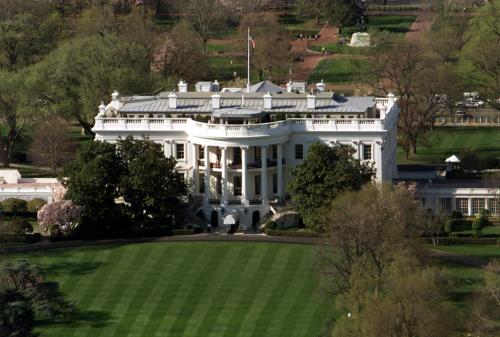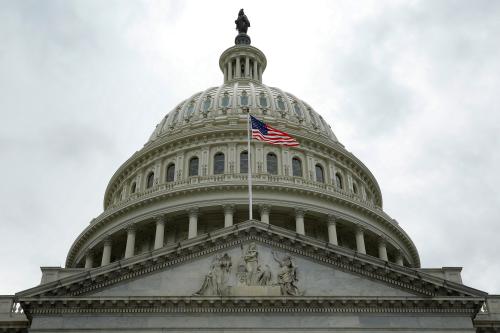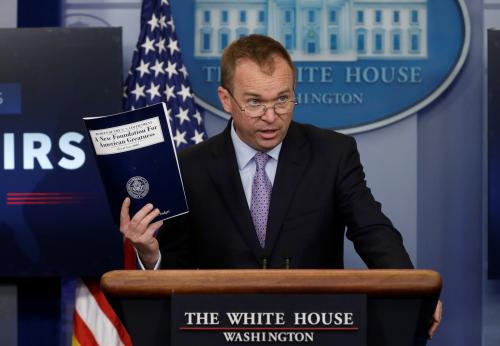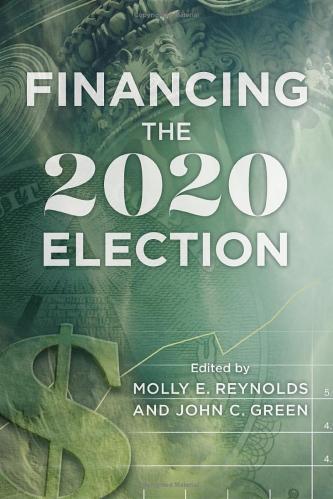On Monday, the White House released its budget for fiscal year 2019, which underwent some last-minute changes following the enactment of the Bipartisan Budget Act (BBA), signed into law on Friday. The president’s budget for State and USAID requests $39.3 billion, nearly $2 billion more than was requested last year. But, as usual, the budget is interesting both for what it says and what it does not say. Here are some quick takes on what is included in the president’s budget request this year:
“No soup for you!”
It is clear that the White House does not intend to allow State and USAID to benefit from the massive deficit spending that is happening elsewhere.
Since the BBA was silent on how funding would be allocated to the Department of State, USAID, and many of the other civilian foreign policy agencies, the White House was creative. By manipulating the funding accounts, the White House was able to turn a $13.8 billion increase for State and USAID into a much smaller $1.5 billion increase which was spread across only three areas: disaster assistance, global health programs, and UN funding. Not coincidentally, these are the three areas that enjoy the largest amount of congressional support.
How did the White House pull this bait and switch? They did it by moving the $12.3 billion in additional funding into the Department’s base budget line and decreasing the so-called Overseas Contingency Operations (OCO) line item by a nearly equal amount. One might ask, “so what?” Well, OCO is essentially a giant slush fund that administrations and Congress have used to avoid discussions about thorny issues like funding for wars in Iraq and Afghanistan.
In proposing to move $12.3 billion from OCO into base funding, the White House is calling Congress out on its hypocrisy. It’s as if they’re saying, “Hey, you say you want to end slush funds like OCO but never do it, so we’re going to do it for you.” Of course, it’s probably disingenuous to conclude that the White House move here is in the name of fiscal transparency. More likely, it’s an attempt to turn congressional budget gimmicks back on them and maintain deep cuts to State/USAID in the process. Very devious.
Democracy promotion is still a four-letter word
Last year, democracy promotion groups hammered the president’s request for proposing dramatic cuts to relevant foreign assistance accounts. While the outcry prompted Congress to ignore the president’s budget request, it did nothing to change the White House’s thinking on value of these programs.
This year, the president’s budget proposes to cut the National Endowment for Democracy (NED) by an additional $36 million from last year’s request—and last year’s request was $67 million less than the level appropriated by Congress. When asked about this proposed 80 percent cut, the Director for the Office of U.S. Foreign Assistance, Hari Sastry, said the cuts to the NED would be offset somewhat by a 50 percent increase for programming by the bureaus of Democracy, Human Rights, and Labor (DRL) in State and USAID’s Democracy, Conflict, and Humanitarian Assistance (DCHA).
Indeed, the President’s budget does propose to raise DRL’s programmatic budget by nearly $36 million but the budget also proposes to slash DRL’s operating budget by nearly 7 percent. It’s unknown from the budget documents provided whether USAID’s DCHA office faces similar cuts.
State and USAID fund their democracy promotion programs out of several accounts, the largest being Economic Support Funds (ESF), Development Assistance (DA), Democracy Fund (DF), and the Assistance for Europe, Eurasia, and Central (AEECA) accounts. Like last year, the president has proposed to consolidate State and USAID democracy promotion funding streams into a single account renamed as the Economic Support and Development Fund (ESDF) and requested a total cut of $3.7 billion. Congressional appropriations committees were skeptical of this proposed change last year and probably will be again.
During the budget roll-out press conference on Monday with Deputy Secretary Sullivan and Administrator Green, Mr. Sastry stated “this administration is not going to fund 501(c)(3) organizations directly.” If Mr. Sastry’s comments are to be taken at face value, the implications would be enormous. In addition to the NED, the elimination of direct funding to 501(c)(3) organizations would mean no more money to Radio Free Europe-Radio Liberty, Radio Free Asia, and the Middle East Broadcasting Networks which operate under the Broadcasting Board of Governors (BBG) umbrella, as well as the Asia Foundation and the East-West Center. It could also mean a cut to funding for programs implemented by organizations like Freedom House, Mercy Corps, and the International Republican Institute, which USAID Administrator Mark Green was president of before his appointment.
The price tag for modernizing State’s IT is $150 million
For the first time, we got a sense of what it’s going to cost to implement the only tangible outcome of the Secretary Tillerson’s “Impact Initiative” (formerly known as the “redesign”) in response to the president’s executive order last year. Rather than seek specific congressional support for IT upgrades, Tillerson has proposed to fund, in part, the reforms through transfers of funds from the Bureau of Consular Affairs which accrues money from the sale of passports and visas. Historically, these funds have been used to support expanded consular services but more recently as “rainy day” funds. For example, during the government shutdown of 2013, no Department employees were furloughed. The 2019 budget proposal makes additional references elsewhere to raiding these consular funds—perhaps signaling an end to State’s consular slush fund as well.
The Brookings Institution is committed to quality, independence, and impact.
We are supported by a diverse array of funders. In line with our values and policies, each Brookings publication represents the sole views of its author(s).










Commentary
What Trump’s budget would mean for the State Department—snap judgments
February 13, 2018